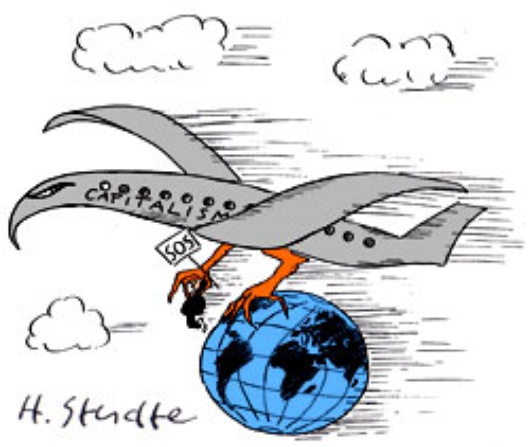It’s not just the economy, stupid
Published on
The consequences of the capitalist system reach far beyond economics, influencing the very fabric of modern society
 Margaret Thatcher once infamously declared that ‘there is no such thing as society'. Seventeen years later the world is a profoundly different place but, with some notable exceptions, the economic system she supported is now the one and only political ideology being exported around the world. The fall of the Iron Curtain caused its only rival, communism, to collapse across Europe. Today the global community as a whole is expected to embrace the wonders of capitalism with enthusiasm. But beyond the economic implications, what does free market capitalism mean for societies, both in Europe and beyond?
Margaret Thatcher once infamously declared that ‘there is no such thing as society'. Seventeen years later the world is a profoundly different place but, with some notable exceptions, the economic system she supported is now the one and only political ideology being exported around the world. The fall of the Iron Curtain caused its only rival, communism, to collapse across Europe. Today the global community as a whole is expected to embrace the wonders of capitalism with enthusiasm. But beyond the economic implications, what does free market capitalism mean for societies, both in Europe and beyond?
Sink or swim
In capitalist terms, Margaret Thatcher was speaking the truth when she dismissed the notion of ‘society’. In a capitalist world, individual success is everything so working for and with others for the benefit of society as a whole is an impossible notion to grasp. Capitalism is inherently individualistic provoking a sink or swim attitude to life. Congratulations to those who learn to swim. For those who sink, well too bad. On the surface, however, the modern capitalist world appears to be community spirited. Ours is a world dominated by the concept of ‘rights’, suggesting that consideration for those less fortunate is central to the Western political system. But the notion of fundamental rights for all was created in the post-war era of social awareness to prevent the powerless being abused by the powerful. Today, these rights are increasingly used to allow individuals to continue to live as they please in the knowledge that under international law they have every ‘right’ to do so and any attempt to deny them is an infringement of those ‘rights’.
Individualism on an international scale
So what does this individualistic trend mean for the glut of international organisations created during that more socially aware post-war era such as the EU, the OSCE, and the United Nations? Just as citizens are intent on pursuing their own success, individual countries are, by all accounts, following the same path. America’s invasion of Iraq is only one example of the modern idea that if the rest of international society disagrees with you, your own desire to do as you please is enough to justify any action. Thus, the United Nations is looking increasingly obsolete as countries disdain the need to work with anyone other than those who provide them with instant gratification. The mood today is about finding ‘allies’, those who are ‘with us’ as opposed to those who are ‘against us’. This return to the age-old system of goodies and baddies is in direct contradiction to the post-war dream of unity and international co-operation.
Likewise, the current malfunctioning of the EU simply reflects the sad reality that its member states no longer wish to work together to improve Europe’s lot but simply to get what they can out of the institutions and then push off as quickly as possible. The idea that part of the EU’s aim is to improve life for all Europeans is now laughable. Why should the UK care if there are problems in Portugal? Why is it France’s problem if Slovakia needs help? Survival of the fittest is the ethos resounding in the corridors of Brussels; hence increasingly common attempts by member states to try to withdraw from certain areas of EU policy should it not fit their individual plans.
Of course, some might argue that there are benefits to be gained from capitalism for society at large. What about the amount of aid these rich, capitalist nations give to third world countries, they cry. International aid is all well and good but even here the selfishness which so often hides in capitalism’s shadow is clear to see. The amount of aid a wealthy nation chooses to give to a poorer one is often influenced by political considerations and tied to future economic benefits for the donor country. It was recently reported that the Bush administration was suspending military aid to countries which refuse to support immunity for Americans from the International Criminal Court. This is not altruism but good old-fashioned manipulation of the weak by the strong.
The fact is that until people stop seeing capitalism as a mere economic system and recognise that it negatively affects the very foundation of our societies, Europe and the world as a whole will continue to suffer. We have managed to create a world where greed and personal gain are so highly valued that the misery of those who are unable, for whatever reason, to run with the herd is all too often overlooked in the race for individual material wealth. Whatever the politicians want us to think, it seems clear to me at least that this is not the international community’s finest hour.



